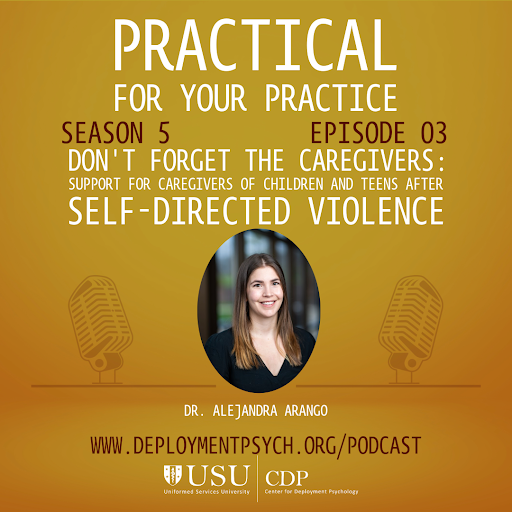 Episode 3, Season 5: Don't Forget the Caregivers - Support for Caregivers of Children and Teens After Self-Directed Violence
Episode 3, Season 5: Don't Forget the Caregivers - Support for Caregivers of Children and Teens After Self-Directed Violence
Guest: Dr. Alejandra Arango
Working with clients with suicidal thoughts and behaviors is one of the more difficult and challenging aspects of being a behavioral health provider. This is perhaps even more so when the client is a child or adolescent. An important, and sometimes overlooked, aspect of working with suicidal youth is working with and supporting their caregivers–moms, dads, grandparents, whoever may be primarily responsible for their care.
How can we best support them while they are dealing with the scary unknown territory of suicide risk management for their child? At at time when almost 20% of high school students report suicidal ideation in the past year, and 10% report a suicide attempt in the same time period, join us for this vital discussion about caregiver care after youth self-directed violence.
 |
 |
Show Notes:
Dr. Alejandra Arango is a Clinical Child Psychologist and Clinical Assistant Professor in the Department of Psychiatry at Michigan Medicine. She received her Ph.D. in Clinical Science at the University of Michigan. Dr. Arango completed a pre-doctoral internship in Integrated Behavioral Health at Nemours/A.I. duPont Hospital for Children, and a postdoctoral fellowship at the Michigan Medicine. Clinically, she is interested in working with adolescents presenting with depression, psychosis, and trauma, and for whom suicide-specific interventions are a core aspect of treatment. Her research interests are in interpersonal factors that positively impact suicide risk, as well as evidence-based practices for intervening with youth at elevated risk for suicide.
Resources Mentioned in this Episode:
- 19:58 & 32:21 National Institute of Mental Health handout re: Suicide Warning Signs - https://www.nimh.nih.gov/health/publications/warning-signs-of-suicide
- 31:38 Zero Suicide - https://zerosuicide.edc.org/
- 31:55 AAP’s Blueprint for Youth Suicide Prevention - https://www.aap.org/en/patient-care/blueprint-for-youth-suicide-prevention/
- 32:28 Training in Youth Suicide Risk Assessment and Management (TBA)
- 33:23 Dr. Arango presents at CDP Presents Monthly Webinar 11 July 2024, Social Connectedness and Youth Suicide Prevention
Calls-to-action:
- Check out the resources Dr. Arango mentioned in the episode.
- Watch Dr. Arango’s CDP Presents Webinar: “Social Connectedness and Youth Suicide Prevention” 11 July 2024
- Leave the P4P team a voicemail with your reactions, questions, requests for topics or guests, or anything else you’d like to share. We want to hear from you! Drop us a line at speakpipe.com/cdpp4p.
- Subscribe to the Practical for Your Practice Podcast
- Subscribe to the Cetner for Deployment Psychology's Monthly Email
This podcast is produced by the Center for Deployment Psychology at the Uniformed Services University of the Health Sciences. The views expressed are those of the speakers and do not necessarily reflect the opinions of the Uniformed Services University, the Department of Defense, or the US Government. In addition, reference to any specific company, products, processes, or services does not necessarily constitute or imply endorsement by the Uniformed Services University, the Department of Defense, or the US Government.
